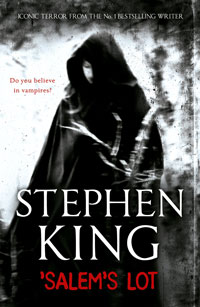(February 21 – March 1)

There’s a well-informed school of musical thought which claims that the first real David Bowie album is The Man Who Sold The World. There are those who might then point out that Bowie actually had a couple of self-titled albums out before then, but people who know what they’re talking about typically feel that The Man Who Sold The World is where “it started to happen” for Bowie.
It’s in similar fashion that Stephen King may have published Carrie first, but it’s Salem’s Lot that better serves as the prototypical Stephen King novel. Both may deal in supernatural forces and tell stories that that end with the destruction of an otherwise innocuous American township, but Salem’s Lot is where the some key tentpoles of the Stephen King Novel truly get driven into the ground.
For starters, it’s a relative chonkster (at 600 pages). It’s filled with characters who come into the tale with an entire life history behind them—and who all get their moments. It’s got a main character who’s an author and, in a slightly darker reflection of King’s real life struggles, this is the first (and far from the last) to feature characters who conspicuously struggle with alcohol.
In the foreword to the edition I read (written in 2005–the foreword that is; not the novel) King ponders his own youthful ambition in trying to combine the classic vampire novel (i.e. Dracula) with the schlock sensibilities of the E.C.Warren comics he grew up reading. It’s somewhat ironic that this was an aspect that I was, in fact, too young too young to pick up on when I first read Salem’s Lot (which may well be the first King novel I ever read … or it may not). There’s a sense that he remains slightly shocked that he had the audacity to attempt such a thing.
While this novel is still better than anything I’m likely to ever write, there are certainly signs of the fledgling novelist at work. The plot is relatively pedestrian (in the sense that it ambles along in uncomplicated fashion towards its conclusion). There are a few too many scenes which revolve around little more than people sitting around and explaining events to one another. There are also adverbs and other literary flourishes which would doubtless get excised from later King novels.
That said, there is plenty to admire here. The creeping, fatalistic sense of menace for one thing; and the vivid characterisation. There is a standout chapter chronicling a day in the life of Salem’s Lot, from sunrise to sundown, which flits from character to character and truly makes you feel like a guest in a rich tapestry. I also appreciate that King has never shied away from treading the darkest possible path for many of his characters. There’s never a guaranteed happy ending when you’re in a Stephen King story.
It’s a solid tale and, accordingly, there have been two adaptations of Salem’s Lot starting with the 1979 miniseries starring David Soul, which I remember being fairly decent for it’s time, and may well check out again sometime soon. There was also a 2004 TV adaptation starring Rob Lowe, which until last week I had quite honestly forgotten even existed, and am happy for it to return to that status. I feel there’s definitely potential in here for a good, modern adaption akin to the recent version of The Stand. However, I’m not holding my breath.
One of the goals of this ridiculous project was for me to rediscover the joy of settling down in bed with a good old-fashioned paperback. Reading this one has certainly achieved that, to the point where I was keenly looking forward to each night’s reading session and quite probably staying up later than I should. I certainly enjoyed my visit to Salem’s Lot, even if it didn’t end well for most of its residents.
Next up: who fancies a winter vacation …?
Post-script: the edition of the book that I purchased (the 2011 ‘Iconic Terror’ Hodder edition, to be precise) comes with a few nifty bonus features. First of these is the short story One For The Road, which is also featured in Night Shift, and tells a creepy little tale set three years after the events of Salem’s Lot.
Next comes a more ambitious short story entitled Jerusalem’s Lot (which also appears in Night Shift). In the afterword to the novel, Stephen King writes about how taken he was with the epistolary format when he first read Dracula. It’s fitting, then, that he uses exactly that style for a tale delving into the past of our favourite little undead township. (Intriguingly, this short story is being adapted into a 10 part series starring Adrien Brody, and entitled Chapelwaite, which probably would have been with us by now if not for certain real-world pandemics).
Finally, about 70 pages worth of deleted scenes are included which, while not essential (deleted scenes get deleted for a reason, after all) are an interesting glimpse into different routes and sideroads that the novel could have taken.
